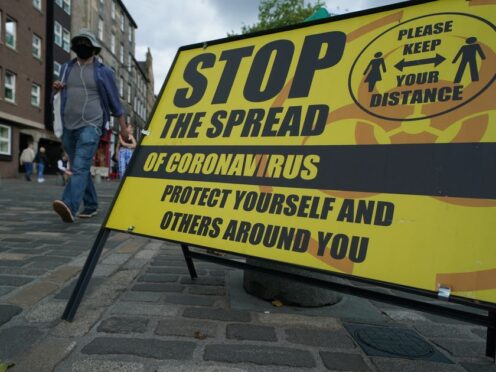
A mother whose son has severe epilepsy has told of her frustration with politicians after she was kept away from him during the pandemic.
Lorraine Mackenzie told the Scottish Covid-19 Inquiry her son David, 45, was living in supported accommodation and receiving one-to-one care when the pandemic began in 2020.
Mrs Mackenzie said she was immediately barred from entering the facility and from having physical contact with him because of Government-imposed restrictions on contact with other people.
She said prior to that, her son, who was diagnosed with West syndrome aged 19, had a “very happy personality” and was “very affectionate”.
She added he was also “very much an outdoor person” and he enjoyed going swimming and to rebound and music therapy prior to Covid.
Mrs Mackenzie said once lockdown came into effect she could only see David, who also has aphasia and ataxia, from a garden outside the property and later within a gazebo set up outside.
She said she was still expected to keep away from him, however – a policy she said she felt was “silly” under the circumstances.
“It was just awful, it really was terrible,” she said. “I think we all suffered emotionally.”
Mrs Mackenzie said when she was finally allowed to take David outside again, she noticed his mobility had deteriorated.
“His balance was very poor and he was walking very gingerly, taking very small steps and holding on to me,” she said.
“To this day, his mobility has not really gone back to how it was pre-Covid.”
We will now hear evidence from Lorraine Mackenzie of @PAMIS_Scotland.
Watch the broadcast online:https://t.co/zwCKfHHCcP
— Scottish COVID-19 Inquiry (@covidinquirysco) May 8, 2024
Mrs Mackenzie went on to tell the inquiry she felt there was “confusion” within the Scottish Government over the differences between care homes for the elderly and supported accommodation for adults with life-long conditions and how they should be treated during times of crisis.
“I think there is very little known about care in the community by the Scottish Government,” she said.
“Care homes and supported accommodation are completely different things altogether.”
Mrs Mackenzie said she also felt politicians were “too far removed” from the everyday goings on in care homes and supported accommodation to be making rules on access for families.
“I’ve often said that politicians should do a shift in a care home or supported accommodation because you can tell people what it’s like, but until you’re actually doing the job – it’s a totally different thing,” she said.
“I think politicians are far too far removed from care in the community. They don’t understand what it takes to care for someone over a 24-hour period.”
The inquiry, before Lord Brailsford, continues.

Enjoy the convenience of having The Sunday Post delivered as a digital ePaper straight to your smartphone, tablet or computer.
Subscribe for only £5.49 a month and enjoy all the benefits of the printed paper as a digital replica.
Subscribe